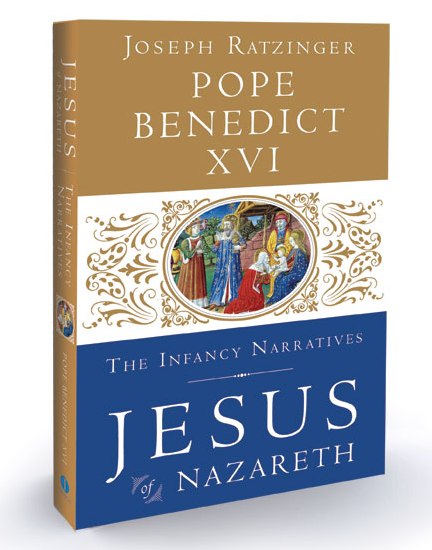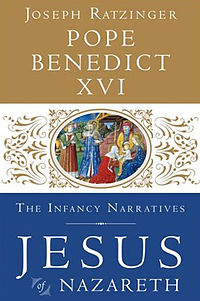Today marks the long-awaited release date for the Pope’s latest, and perhaps final, book. Titled Jesus of Nazareth: The Infancy Narratives (Image Books, hardcover, 144 pages), it’s the third volume in his trilogy on the life and teachings of Jesus Christ.
A Facebook friend asked if he should read this latest volume now, or wait until he read the first two books in the trilogy. Here’s what I recommend:
I actually think the third volume would be a good precursor to the other two so I’d read it first. Here’s why:
1. It’s shorter. Volume 3 is just 144 pages while the other two are 300+ pages each.
2. It’s timelier. It covers themes relating to Advent and Christmas which are the liturgical seasons we’re about to enter into.
3. It’s first, chronologically. The events here precede the other two volumes so it makes sense to read it first.
If I were you, I’d read Volume 3 (Infancy Narratives), then Volume 1 (Baptism to Transfiguration), then Volume 2 (Holy Week). That would give you a linear, comprehensive “life of Christ.”
I’m diving into my copy tonight and plan to review it soon. But in the mean time, scroll below and find the publisher’s description, a video trailer, and a special excerpt from the first chapter.
Jesus of Nazareth: The Infancy Narratives
by Pope Benedict XVI
Image, 144 pages, hardcover
Released on November 21, 2012
 In 2007, Joseph Ratzinger published his first book as Pope Benedict XVI in order “to make known the figure and message of Jesus.” Now, the Pope focuses exclusively on the Gospel accounts of Jesus’s life as a child in this momentous third and final book in the international best-selling Jesus of Nazareth series.
In 2007, Joseph Ratzinger published his first book as Pope Benedict XVI in order “to make known the figure and message of Jesus.” Now, the Pope focuses exclusively on the Gospel accounts of Jesus’s life as a child in this momentous third and final book in the international best-selling Jesus of Nazareth series.
The root of these stories is the experience of hope found in the birth of Jesus, our Savior, and the affirmations of surrender and service embodied in his parents, Joseph and Mary.
This is a story of longing and seeking, as demonstrated by the Magi searching for the redemption offered by the birth of a new king. It is a story of sacrifice and trusting completely in the wisdom of God as seen in the faith of Simeon, the just and devout man of Jerusalem, when he is in the presence of the Christ child.
Ultimately, Jesus’ life and message is a story for today, one that speaks to the restlessness of the human heart searching for the sole truth which alone leads to profound joy.
Here’s a special excerpt from Jesus of Nazareth: The Infancy Narratives which comes from the first chapter. In the chapter, Pope Benedict reflects on the genealogies of Jesus, but here looks at the opening verses in St. John’s Gospel:
John the evangelist, who repeatedly raises the question of Jesus’ provenance, does not present a genealogy at the beginning of his Gospel, but in the Prologue he grandly and emphatically proposes an answer to that question. At the same time he expands his answer to the question into a definition of Christian life: on the basis of Jesus’ provenance he sheds light upon the identity of his followers.
“In the beginning was the Word, and the Word was with God, and the Word was God…and the Word became flesh and dwelt [pitched his tent] among us” (Jn 1:1– 14). The man Jesus is the dwelling- place of the Word, the eternal divine Word, in this world. Jesus’ “flesh,” his human existence, is the “dwelling” or “tent” of the Word: the reference to the sacred tent of Israel in the wilderness is unmistakable. Jesus
is, so to speak, the tent of meeting—he is the reality for which the tent and the later Temple could only serve as signs.
Jesus’ origin, his provenance, is the true “beginning”—the primordial source from which all things come, the “light” that makes the world into the cosmos. He comes from God. He is God. This beginning” that has come to us opens up—as a beginning—a new manner of human existence. “For to all who received him, who believed in his name, he gave power to become children of God; who were born, not
of blood nor of the will of the flesh nor of the will of man, but of God” (Jn 1:12f.).
One version of the manuscript tradition preserves a reading of this sentence not in the plural but in the singular: “who was born, not of blood…” This makes the sentence into a clear reference to the virginal conception and birth of Jesus. Jesus’ being from God, as affirmed by the tradition preserved by Matthew and Luke, would be concretely underlined once more. But this is only a secondary reading: the authentic text of the Gospel speaks quite clearly here of those who believe in Christ’s name and who receive a new origin through that name. Yet the connection with the confession of Jesus’ birth from the Virgin Mary is undeniably present: those who believe in Jesus enter through faith into Jesus’ unique new origin, and they receive this origin as their own. In and of themselves, all these believers are initially “born of blood and of the will of man.” But their faith gives them a new birth: they enter into the origin of Jesus Christ, which now becomes their own origin. From Christ, through faith in him, they are now born of God.
So John has recapitulated the deepest meaning of the genealogies, and moreover he has taught us to understand them as an interpretation of our own origin, our true “genealogy.” Just as the genealogies break off at the end, because Jesus was not begotten by Joseph, but was truly born of the Holy Spirit from the Virgin Mary, so it can now be said of us that our true “genealogy” is faith in Jesus, who gives us a new origin, who brings us to birth “from God.”
Read more excerpts from Jesus of Nazareth: The Infancy Narratives.


